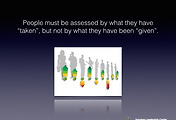A good rifle for a wrong target: a problem of HRD field of study.
[맞아죽을 각오로 쓰는 인재개발분야 (HRD) 문제점.]
Having a good and reliable rifle gives a shooter a great chance to reach a target. However if a shooter targets a wrong target, a good rifle is useless, even worse it is frequently harmful.
A wrong targeting problem is observed in HRD field of study.
Prior to describing my claims, I define HRD is “a process of developing work‐based expertise and unleashing human capabilities for the benefits of an individual, organization, community, nation, or, ultimately, the whole of humanity whereby multi‐level stakeholders collectively influence people and organization to achieve common goals (efficiently) through training & development, organization development, career development, performance improvement, organizational learning, and leadership development.“
According to the definition, HRD field of study has a great potential to lead people to a right direction as like having a good and reliable rifle. However, the purpose of HRD is not frequently attained in the real workplace not because of the contents of HRD, but because of a wrong targeting.
So, what is the right target for HRD?
I am insisting that "Frontline managers and organizational leaders such as executives who want to develop their people" are the right target population for HRD.
Here are my claims.
First, Frontline managers and Executives have a fatal flaw in developing people. According to a recent empirical study, the most common area of weakness for ineffective senior leaders is their ability to develop others. This fact clearly suggest HRD must address the need of developing people skills for Frontline manager and Executives than any other populations.
http://blogs.hbr.org/2013/12/10-charts-from-2013-that-changed-the-way-we-think/
Second, the People development skill, the most burning requirement for Frontline managers and Executives, is a conceptual skill rather than technical or social skills, which integrates multiple skill sets such as Training, Organizational Change/Development, Career Development, and Leadership Development. As shown in the following figure, conceptual skills are highly required along with a person's getting a higher ranking within an organization. Thus, HRD skill development must be targeted on the high rank personnels.
Third, Frontline manager and Executives have influencing powers to realize the purpose of HRD. Many HRD scholars have insisted that HRD must be a strategic partner in decision making process. However, the strategic role of HRD have hardly observed in the field. This is because of lack of influencing powers of HRD personnels what Frontline managers and Executives have.
So, what?
Here are my suggestions for HRD professionals.
First, HRD should Target to the Frontline managers and Executives for developing "people development skills" rather than entry level employees to have specific knowledge.
Second, HRD should let the Frontline managers and Executives do the HRD function rather than intervene directly. According to the 70-20-10 rule for people development, 90% of people development is occurring on the "Job" while only 10% people development is occurring in the classroom. So, let the Frontline managers and executives take the major responsibility of people development in their jobs. The HRD role should be limited in supporting Frontline managers and Executives to perform people development in their daily managerial tasks.
Third, HRD should Stay in the supportive function, and it should Be independent from daily and routine works. HRD is a long term action, which requires the antecedent planning and preemptive execution. Immediate and short-term works frequently hinders the long-term goal achievements through people development. So, HRD professionals should make an extra effort to be independent from a short-term goal orientation of Frontline managers and Executives. HRDers must give "Insights and Directions" rather than immediate "Knowledge and Skills".
Finally, HRD should make special efforts to Transform and Develop Frontline managers and Executives as HRDers. Who are HRD professionals? Individuals who hold a HRD master/PhD degree? Sorry but Nope!. A HRD professional is a person who actively engage in developing people. Thus, anyone who is engaging in developing people is an HRD professional. Having specific HRD theories and knowledge is not sufficient. HRD professionals must engage in real people development functions. In this perspective, Frontline managers, Executives, or post-MBAs are the best candidates for being the best HRDers. Let's develop Frontline managers and Executives as the best HRDers.
Conclusion.
In this essay, I cordially pointed out a wrong targeting problem in HRD field of study. While current HRD function targets developing entry level employees, I am insisting that the real target for HRD is the populations of Frontline managers and executives. I suggest that HRD professionals must stay in supporting function with a high level of independency from daily works within organizations in order to focus on long-term planning and developing people for achieving long-term goals. In addition, I suggest HRDers should make extra efforts to transform and develop Frontline managers, executives, and post-MBAs as professional HRDers.
Feb. 09, 2014
Jeonghwan Choi, PhD, MBA, ME
'Meditation on Leadership > Thoughtful Leadership' 카테고리의 다른 글
| The Real Secret Weapon of the US? H1B - 미국의 최종비밀병기: 전문직 비자 (0) | 2014.05.24 |
|---|---|
| Be attractive than competitive! (경쟁력보단 매력) (0) | 2014.05.18 |
| A criteria for assessing a person (사람을 평가하는 기준). (0) | 2014.01.30 |
| Your Employees Want the 'Constructive Feedback'! (0) | 2014.01.17 |
| Seniors are not expenses, but they are potentials (노인은 비용이 아니라 가능성이다). (0) | 2013.11.20 |











댓글